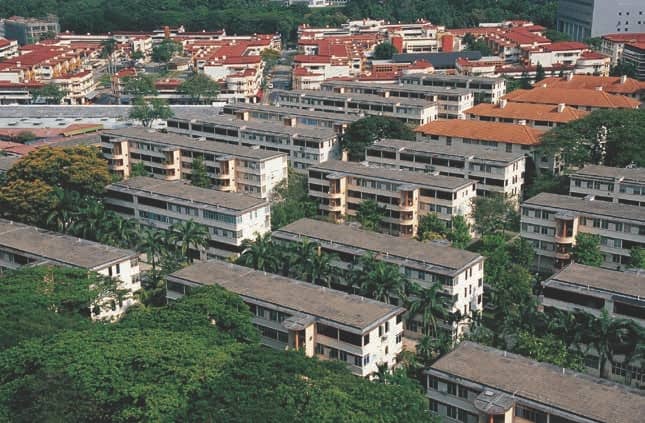試す 金 - 無料
Conserving Singapore's Modern Built Heritage
d+a
|Issue 116
The architectural community weighs in on this topic and identifies the obstacles that stand in the way.

Let us be honest: Modernist buildings are not the easiest to love. Abstract, hard-edged, unornamented, and often composed of solid, simple walls of reinforced concrete, they are the antithesis of conventional definitions of beautiful architecture.
In Singapore, they are everywhere, since the country underwent rapid urbanisation when the modern tradition was in vogue, loosely defined as from the 1950s to the 1980s.
It naturally begs the question of why they are special and worth saving – in short, what exactly is the fuss?
ARCHITECTS STATE THEIR CASE
Perhaps the most compelling argument is that they are symbols of Singapore’s “can-do spirit” in its nation-building years.
“These are the tangible legacy of the visionary leadership of local politicians, planners, developers, and architects who created a vast new landscape during 1965 to 1975,” says Ho Weng Hin, one of the three founding members of the Docomomo-Sg Working Group-In-Progress and Founding Partner of Studio Lapis.
For example, the Pearl Bank Apartments, designed by architect Tan Cheng Siong, became an important prototype for high-rise, high-density urban living that embodied the pioneering spirit and innovation of that era.
While it still stood, it was studied and feted by architects, planners, urbanists, architectural historians and heritage enthusiasts both as an elegant solution to applied urban research and experiment, and for its pure bold modernist aesthetics.

このストーリーは、d+a の Issue 116 版からのものです。
Magzter GOLD を購読すると、厳選された何千ものプレミアム記事や、10,000 以上の雑誌や新聞にアクセスできます。
すでに購読者ですか? サインイン
d+a からのその他のストーリー

d+a
designing the future
Happening in Frankfurt, Germany, Ambiente 2026 expands with fresh concepts in interiors, hospitality, and lifestyle
1 mins
Issue 136

d+a
mastering water
From water-saving innovation to smart toilets, Geberit continues to set benchmarks in bathroom technology, delivering solutions where design and function are inseparable.
2 mins
Issue 136

d+a
a winery that floats above the vines
Sauska Tokaj winery is an architectural statement set amid one of the world's great wine regions. Its hovering form, immersive visitor experience, and cutting-edge design celebrate both the legacy and future of Tokaj winemaking.
1 min
Issue 136

d+a
mountains and gardens
Forbes Residences takes WOHA's discourse on residential high-rise living to Perth's Applecross suburb.
3 mins
Issue 136

d+a
craft, culture, and contemporary living
Zucchetti continues to innovate through visionary collaborations, sustainable practices, and a design culture that bridges past and present.
3 mins
Issue 136

d+a
the new language of stone
Timeless yet forward-looking, Antolini's natural stone redefines luxury through sustainability, durability, and design – a vision brought to Singapore by Hafary.
2 mins
Issue 136

d+a
augmented forms
Kuala Lumpur Architecture Festival's mainstay event, DATUM:KL, fielded a star-studded international roster showcasing a breadth of contemporary designs and ideas across the globe.
4 mins
Issue 136

d+a
DESIGN TRENDS OF 2026
Innovation meets responsibility: from adaptive furniture and tactile linens to sustainable bathrooms, smart lighting, and timeless stone surfaces, D+A explores trends set to shape design in the coming year.
11 mins
Issue 136

d+a
shaped with clay
KKAA'S UCCA Clay not only showcases traditional pottery craft but uses clay products to create a unique, authentic architecture.
3 mins
Issue 136

d+a
celebration of craft
An exclusive collaboration that transforms natural fibres, artisanal dyeing and intricate weaving into resort wear and amenities.
3 mins
Issue 136
Translate
Change font size

